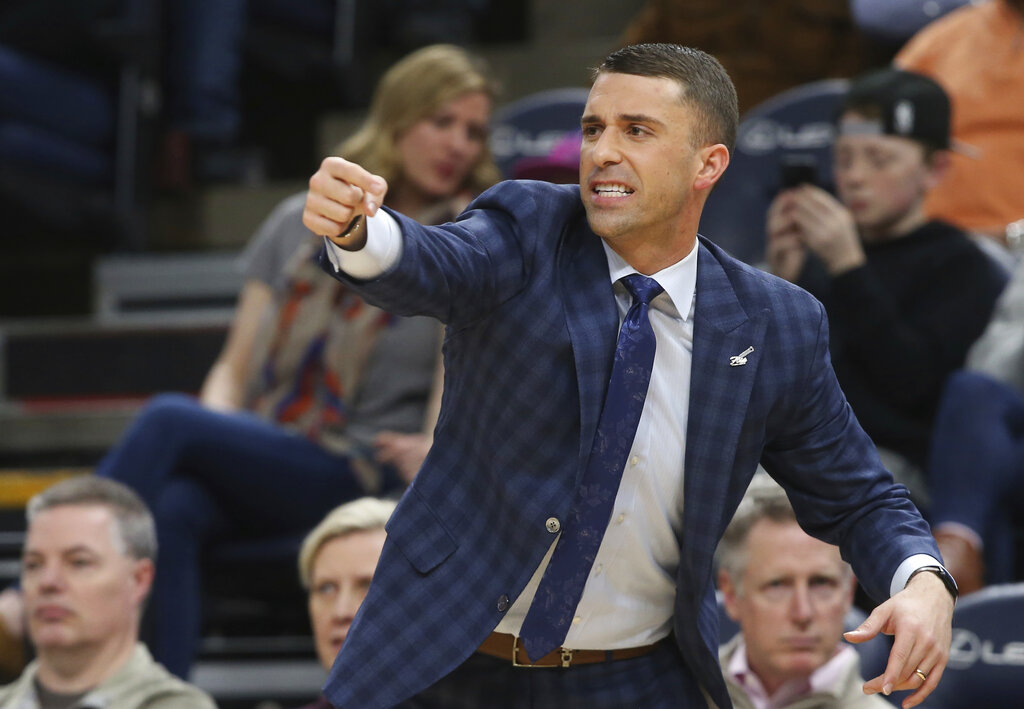Timberwolves retain Ryan Saunders, NBA’s first millennial head coach

FILE – In this March 9, 21019, file photo, Minnesota Timberwolves interim head coach Ryan Saunders directs his players against the Washington Wizards in an NBA basketball game in Minneapolis. A person with knowledge of the process tells The Associated Press the Minnesota Timberwolves and Ryan Saunders are finalizing a contract to make the 33-year-old their permanent head coach. The person spoke to the AP on condition of anonymity Monday, May 20, 2019, because the Timberwolves had yet to announce the decision made by new president of basketball operations Gersson Rosas. (AP Photo/Jim Mone, File)
MINNEAPOLIS— The Minnesota Timberwolves have chosen Ryan Saunders as their full-fledged head coach — and the first millennial to hold the job in the NBA.
The team announced Monday that the 33-year-old Saunders will stay in the post he held on an interim basis during the second half of this past season, the role long held by his father. The widely expected decision was made by new president of basketball operations Gersson Rosas.
“I’ve known Ryan for many years and have always respected his approach to the game, work ethic, basketball knowledge and passion,” Rosas said in a statement.
“His coaching style and philosophies are ideal for the modern NBA, and I am confident that as a partner he will get the most out of our players as we build an identity and a sustainable winning model.”
With Saunders and the 40-year-old Rosas, the Timberwolves have a leadership duo that, at the combined age of 73, is only three years older than San Antonio president and coach Gregg Popovich and 12 years older than their predecessor Tom Thibodeau.
The next-youngest coach in the league behind Saunders is Sacramento’s Luke Walton, who is 39. He just missed the millennial cutoff, defined by the Pew Research Center as people with birth dates between 1981 and 1996.
When Rosas was hired earlier this month , Timberwolves chief executive officer Ethan Casson said there was no mandate from owner Glen Taylor to keep Saunders in charge on the sideline, but even Casson acknowledged Taylor’s unabashed fondness for the son of the late Flip Saunders, who was one of the most instrumental figures in the history of the 30-year-old franchise.
After Thibodeau was fired on Jan. 6 , the Timberwolves finished just 17-25 under Saunders, but players unabashedly endorsed his leadership. His fifth season as an assistant coach with the team presented a most unexpected promotion to the job his father held over 11 different seasons, including a one-year return in 2014-15 before he died of cancer. Ryan Saunders, who is the 13th head coach in Timberwolves history, even has some of the same facial expressions and nervous tics on the sideline that his dad once displayed.
The highlight of the season for the Timberwolves, after they started slowly during Jimmy Butler’s trade demand saga and before they faded late amid a slew of injuries, was their first win under Saunders, a 119-117 decision at Oklahoma City on Jan. 8 on the heels of the ouster of Thibodeau, who held the dual role of president and coach. Saunders was soaked with water by the players, a handful of whom being older than him, in a joyful postgame celebration in the visiting locker room .
Though the Timberwolves wound up with a 36-46 record in 11th place in the Western Conference, players spoke often of an enlightened environment around the team after Saunders took over. While also showing an eagerness to experiment with more innovative on-court strategies, he developed a rapport with the majority of the roster.
Much of the tension present last season traced to Butler’s dissent, before he was dealt to Philadelphia, but Thibodeau’s old-school style and in-game intensity never appeared to bring out the best in some of the team’s younger players.
Though the won-loss record didn’t receive a bump, several of the players were noticeably more productive in the second half of the season under Saunders than in the first half with Thibodeau. All-Star center Karl-Anthony Towns and second-leading scorer Andrew Wiggins, for example, each posted increases in shooting, scoring, rebounding and assists.
“He gets guys. He connects with them, and you are willing to go that extra mile,” backup point guard Tyus Jones told reporters late in the season.
Said Towns, prone to hyperbole: “He’s the greatest communicator, possibly, in the NBA. The process has been so much easier when you have a person like that. The culture is getting better every single day.”
Saunders spent five seasons as an assistant coach for the Washington Wizards before returning to his home state to work for his father. He was a walk-on in college at Minnesota, where Flip Saunders also played.